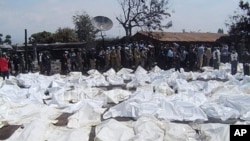President Kabila has declared a national period of mourning after a tanker explosion left more than 200 dead in the eastern Democratic Republic of the Congo.
Flags around the Kinshasa flew at half staff after President Joseph Kabila of the Democratic Republic of the Congo declared two days of national mourning for victims. Mr. Kabila has flown to the site of the explosion to console families of the victims killed and observe the humanitarian relief efforts.
The International Committee of the Red Cross estimates that more than 230 bystanders were killed and 180 injured after a tanker carrying oil crashed Saturday near Sange, about 20 kilometers west of the Burundian border.
According to local reports, the truck overturned while trying to avoid traffic and began spilling oil. Though the injured driver was pulled to safety, the tanker spilled fuel for nearly an hour, attracting nearby residents who were lined up to tap the oil when the tank exploded.
The blast also spread to buildings across the street, killing and injuring residents who had gathered to watch the World Cup in makeshift shacks.
Relief efforts are being coordinated between various international organizations, such as the United Nations and the International Committee of the Red Cross, and the government in Kinshasa.
According to a spokesperson for the U.N. Stabilization Mission in Congo, Madnodje Mounoubai, the United Nations has provided ambulances and security for the relief efforts as well as helicopter transport to hospitals in either Bukavu or Uvira for the most severely injured.
Mounoubai said Congolese authorities are providing assistance wherever possible, but added the extreme nature of the blast has overwhelmed local capacities for assistance.
"Nobody was prepared for this. In addition to that, medical facilities either in Bukavu or Uvira, they are not equipped to deal with injuries of this type," said Mounoubai. "We do not have any burn units in this area. So, obviously, they were not prepared for this."
The Congolese Red Cross has been providing medical supplies and body bags to relief workers as well as helping identify the remains of badly burned victims.
Many of the dead who cannot be identified have been buried in mass graves near the crash site. President Kabila is scheduled to visit the burial sites during his tour of the region.




